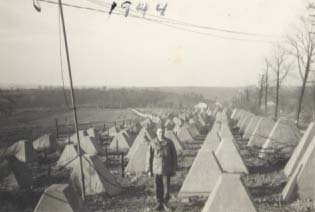Page 1
Page 2
Page 3
Page 4
Page 5
Page 6
Page 7
Page 8
Page 9
Page 10
Page 11
Page 12
Page 13
Page 14
Page 15
Page 16
Page 17
Page 18
Page 19
Page 20
Webmaster
Comments
An Ambulance
Driver's
Experiences in World War II
From Omaha Beach to the Malmédy Massacre
by
Howard E. Nixon
6 April 1923 - 29 December 2001
A house was built in the wall of the park where we were at. Bill Chasteen and I discovered that a candy bar to the old lady in the house would let us out at night. We went out to supper with a couple of girls. There was fighting in the streets then. One of the girls was excited about something. We found out that her boss was shot out of the upstairs window. They gave us a good meal one dish at a time with wine. I was thirsty for water, but the water was not good. I was getting groggy from the wine - so when they weren't looking I drank the water anyway. Then we had to go back to our outfit in the dark. We had to cross the river bridge with bullets spanging off the walls, but we made it.
A couple of guys thought that they would check out the Notre Dame cathedral. They went in, but discovered Germans were behind the altar. The Germans started shooting and our guys dived behind the seats. The Germans were captured. All of the churches had bullet holes in them.
One night we were on an ambulance run and a bomb hit a house right beside me on the street. It blew the house to smithereens. We were in Paris about a week and moved out. It took a week or more for the French to clear out all of the Germans.
The Germans kept backing up a little at a time. We went toward Verdun - a World War I battlefield with its cemeteries. World War I soldiers were buried there and soldiers passed by the graves of their uncles or even fathers. There were more dead horses, cattle, and sheep. Some of the dead horses were still hitched to wagons. The Germans had eaten on some of the horses. The battle raged on and on.
One night we moved to the front in a cold raining night. I was so tired that I couldn't keep awake. Oh for a little sleep. The convoy stopped for a minute. I went to sleep and woke with a start. I thought that they had left me. I threw the ambulance in gear and took off. I slammed right into Wayne Scott's ambulance. Out he come. "What the hell are you doing?" What could I say? I had caved the back end of his ambulance in, but with a little hammering he could shut the doors and lock them.
There were men who got shell shock or battle fatigue. They were like zombies. They just stood and stared. We had to take them by the hand and lead them around. They were out of it for a while. I don't know if they ever came back. Some wounded were treated and sent back to their front line units.
 |
| Me at the Siegfried Line in 1944 |
Those missing in action were never found, of course not. Often times there was nothing left of them. Maybe there would be a shoe or helmet, but nothing else. A lot of men missing in action were captured. A whole lot of them died in German prison camps. Their food was horrible and they were cramped in close quarters giving rise to diseases.
By this time we were getting close to Aachen and the Siegfried Line. It was a line of row upon row of cement pillars set in the ground. It was designed to stop tanks or anything else. It didn't work. They blew a hole in them and bulldozed their way through. I have a picture of me on the line in 1944 and again in 1984 when I went back to visit.
The town of Verdun still had evidence of World War I - old fence entanglements, old hand grenades - what they called potato mashers. The old trenches were also there.
Page 11
Previous Page Next Page
© Copyright, Howard E. Nixon, 2001.
Address comments to:
Howard's son Pat Nixon or his daughter Cindy Guernsey at the following
email addresss:
nixon748@cox.net nixon748@cox.net or
cindyguernsey@chartermi.net cindyguernsey@chartermi.net.